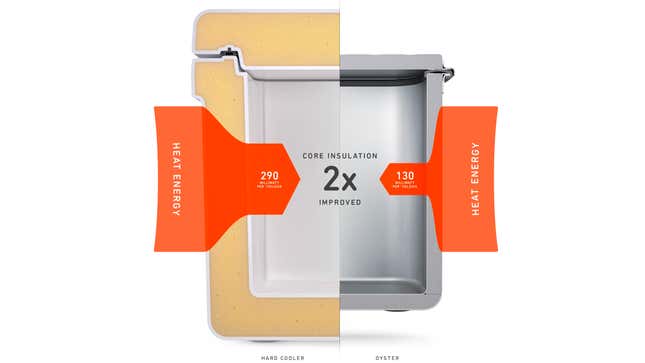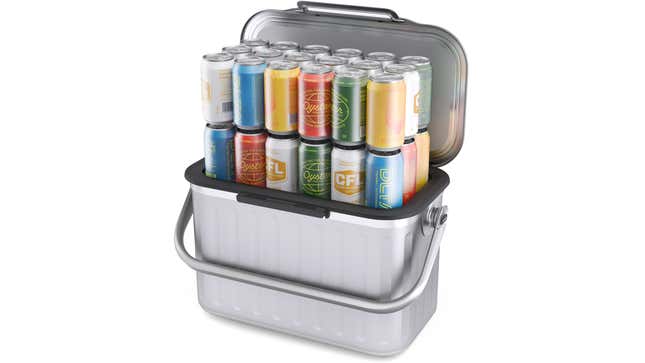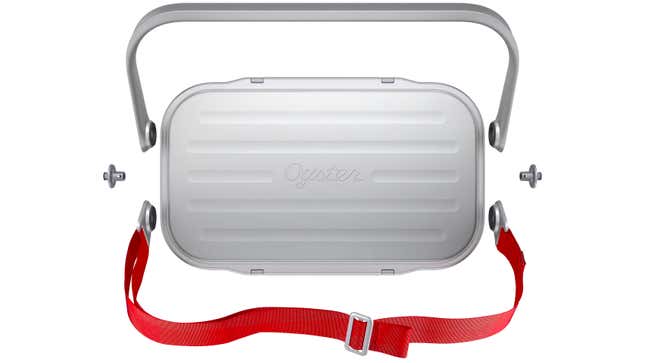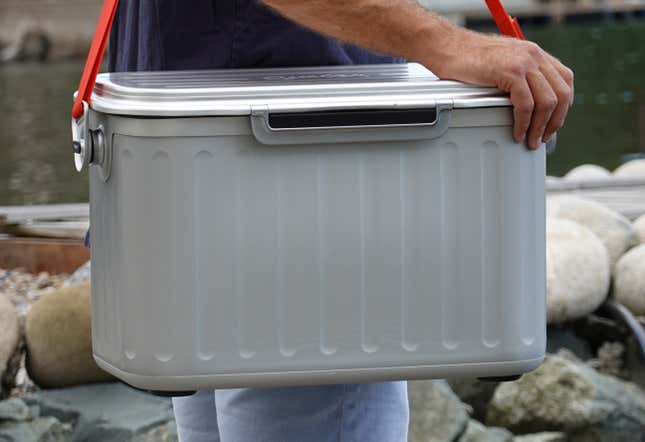Who would’ve thought the lowly cooler would one day be elevated to an object of status? Rolling up to the beach with a Yeti in tow is now as much a status symbol as the car that got you there, but there’s another company vying for that same level of brand recognition with a slick cooler called the Tempo that promises to outperform what’s already on the market, and look good while keeping your drinks cool.
With disposable styrofoam coolers on their way out (even Igloo now makes a biodegradable cooler made from tree pulp) there are now two approaches to making a durable insulated cooler. They both feature the same basic double-walled design that’s filled with materials to prevent heat energy from being transferred in or out, but it’s what’s between those walls that will greatly affect both the performance and price of a cooler. Foam insulation is cheap and easy to implement, but you need a lot of it to be effective, requiring the walls of your cooler to be thicker. This has the negative side effect of reducing the cooler’s interior capacity.
Advertisement
That’s why insulated mugs and tumblers (including the iconic Thermos and Yeti’s drink products) instead use a double-wall design with absolutely nothing in between: a vacuum that minimizes heat transfer while maximizing the interior capacity of the vessel. But it turns out that super-sizing a vacuum-insulated tumbler isn’t as easy as just making everything bigger. Oyster, a Norwegian company, has apparently spent the last six years designing and perfecting its first product, the Oyster Tempo, which promises to outperform traditional hard coolers when it comes to insulation and capacity.

G/O Media may get a commission
Advertisement
Advertisement
Like insulated tumblers and water bottles, the Oyster Tempo features an aluminum double-walled design with a vacuum inside it. That allows for its double walls to be considerably thinner than a cooler filled with foam insulation, so the Tempo itself is both smaller overall, while still offering a lot of capacity inside.

Advertisement
Oyster says the initial version of the Tempo cooler will be available in a single 23L capacity, providing enough space for 36 cans plus a pair of thermal batteries underneath them, which is what the company calls the included gel-based ice packs. However, the company also promises the Tempo can keep pre-chilled items cold for twice as long as other “premium hard coolers” without the need for any ice at all, and its use of aluminum means its interior gets colder three times faster than coolers made from plastic, so the contents can hold their initial temperature for longer.

Advertisement
What might be most appealing about the Oyster Tempo, particularly to a generation that cringes at the sight of the styrofoam coolers we know will be in landfills for hundreds of years, is that the cooler is easily repairable (the carrying strap, handles, and lid latches can all be disassembled and removed) and nearly completely recyclable (since it’s made from aluminum). So should it not survive a mishap during an adventure, or have a run in with a hungry bear (it is not certified bear-proof) that breaks its crucial vacuum seal, the Tempo can be melted down and turned into a new one.

Advertisement
The Oyster Tempo cooler is available today through the company’s website and includes a pair of ice packs sized to fit inside, as well as a carrying handle that can be swapped with a carrying strap. At $500, it’s certainly not cheap, and out of the gate it’s already facing some stiff competition from the company that’s already synonymous with coolers, Yeti. That company’s V Series vacuum-sealed stainless steel cooler offers 55L of capacity, enough space for 96 cans before you add ice, for $800. However, with a plastic interior that won’t cool down as evenly or quickly as the aluminum interior of the Tempo, Yeti might finally be seeing some stiff competition in this space, and from a country that already knows a thing or two about being cold.
Want more of Gizmodo’s consumer electronics picks? Check out our guides to the best phones, best laptops, best cameras, best televisions, best printers, and best tablets. And if you want to learn about the next big thing, see our guide to everything we know about the iPhone 15.
Services Marketplace – Listings, Bookings & Reviews